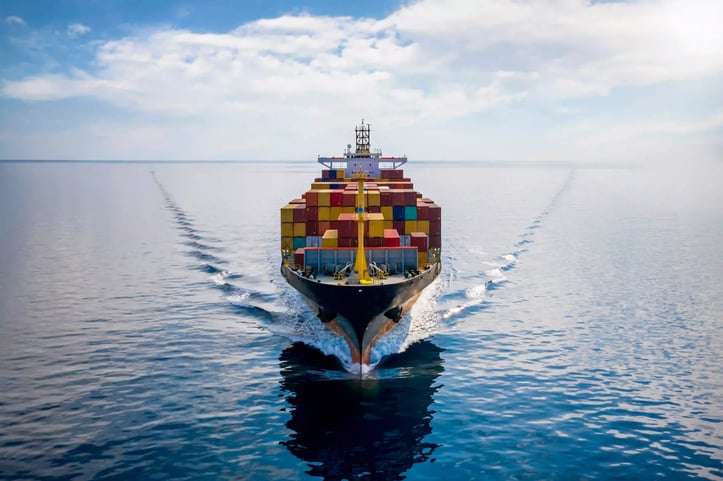
The surge in the global Blue Economy - what role for deep tech?
July 2024
by Chris Taylor, Senior Consultant at 42T
In 2023, the value of the American blue economy surged to around $443 billion, signalling a trend for the rest of the world. Which sectors hold the biggest opportunities and what impact will new technologies play?
This blue, or ocean, economy's growth continues year on year, showcasing the vital role of marine-related activities such as tourism, fishing, transportation, and energy in the international economy.
%20(1).webp?width=1067&height=600&name=shutterstock_2175462407%20(1)%20(1).webp)
While definitions vary, most acknowledge that the 'blue economy' is any economic activity within the maritime sector. While there is some focus on sustainable and environmental activities, it is really the combination of traditional maritime activities - fishing, oil and gas, etc, with newer industries like aquaculture, renewable energy, marine biotechnology, and coastal tourism which need to be included, with a focus on how these activities can be more sustainable.
Undoubtedly there are economic opportunities to be had in the pursuit of the way we use our oceans, and to make positive change to what we’ve done and how we plan to use our oceans in future. Innovators around the world are developing products and businesses to address these needs and challenges in ever more creative and original ways.
This has led to a further development, namely ‘blue tech’ which focuses on sustainability and logistics built on the back of improved data collection, analysis and dissemination of ocean and coastal-derived data. This information is being used to support economic growth, and protect the ocean’s health, as well as effect societal change while addressing the some of the more stubborn challenges we face.
The challenge: utilisation, but with minimal impact
The only way to determine how to improve a situation is to understand it, and the variables that affect it. This is where science and technology come in: innovation and data monitoring and generation can assist in further understanding the ocean and its ecosystems.
The challenge is therefore to create a sustainable and equitable ocean and coastal economy through the use of science and technology to generate knowledge and data that not only assists in the utilisation of the world’s oceans for energy generation and material resources extraction, but that also gathers information to help address societal challenges such as climate change and inspire possible solutions.
While the blue economy builds on the traditional maritime economy, it relies on new tech, sustainable thinking and logistics of improved collection, analysis and distribution of ocean and coastal-derived data. Harnessing the power of big data in informing decisions and the development of technology in the pursuit of information, to advocate for efficiency improvements and change.
%20(3).webp?width=736&height=407&name=Volcano-o-3d-map-hires%20(1)%20(3).webp)
Niuatahi submarine volcano - a huge caldera in the NE Lau basin, far northern territory of Tonga. Image courtesy: Submarine Ring of Fire Exploration, NOAA Vents Program
Where do opportunities lie?
The blue economy has expanded into several relatively new areas, driven by advancements in technology, increased awareness of environmental sustainability, and innovative business models. Some of these new areas include:
Marine biotechnology
- Marine pharmaceuticals - exploration and development of drugs from marine organisms to treat diseases
- Biofuels - production of biofuels from algae and other marine resources
Ocean renewable energy
- Offshore wind farms - generation of electricity through wind turbines located in ocean waters
- Wave and tidal energy - harnessing the power of ocean waves and tides to produce renewable energy
Marine robotics and autonomous systems
- Autonomous Underwater Vehicles (AUVs) - used for ocean exploration, data collection, and environmental monitoring (eg. EvoLogics's Quadroin.)
- Drones - employed for marine research, surveillance, and mapping
Sustainable aquaculture
- Integrated Multi-Trophic Aquaculture (IMTA) - farming multiple species together to create balanced ecosystems and reduce waste
- Recirculating Aquaculture Systems (RAS) - closed systems that recycle water, minimizing environmental impact
Blue carbon initiatives
Carbon sequestration in coastal ecosystems - projects focused on restoring and protecting mangroves, seagrasses, and salt marshes to capture and store carbon dioxide from the atmosphere.
Marine spatial planning and data analytics
- Ocean data platforms - development of platforms for collecting and analysing ocean data to support sustainable management of marine resources, ocean exploration and research
- Marine spatial planning tools - used to allocate space in marine environments to balance ecological, economic, and social objectives
The economist, author and entrepreneur, Gunter Pauli, considers the blue economy a “portfolio of opportunities” in his book titled ‘The Blue Economy where he says that “we need to focus on things we don’t see, but know.”
The opportunities are not purely fiscal to those brave enough to innovate, but critical to the necessary changes we need to make to improve our current climatic situation on the planet.
%20(1).webp?width=760&height=493&name=shutterstock_1074583736%20punch%20(3)%20(1).webp)
Fish farming in Greece
Ocean monitoring and conservation
In the 1980’s we connected an ECG to a whale which sent the data via satellite. Today, we send the same data via ultrasound to a device the size of a pen drive over 8km away. By monitoring the wellbeing of wildlife via ECG devices instead of GPS, it has been found that satellite connectivity isn't necessary, so ultrasound can be adopted to transmit the data. Similar ultrasound communication systems could be developed for other applications.
Another example of new applications for tech is in global weather forecasting, the biggest popular market for data. When we forecast, one of the ways we do it is by obtaining air pressure data from satellites. Today, a similar principle is being adopted for weather buoys and is enabling weather predictions 4-5 hundred times more accurate than the satellite system alone.
The idea stems from the remarkable weather fish Misgurnus fossilis which has cells - as do octopuses - that determine water pressure. This enables them to know when bad weather is approaching so as to move away from the area.
Taking a similar lead from nature, remotely operated vehicles (ROVs) are now being used to monitor and clean the seabed by installing helical anchors to promote kelp growth and for monitoring, thereby protecting mussel reefs.
Other innovations include oil spill detections systems, marine debris collection devices, and water treatment systems which aim to improve efficiency of ships, reduce pollution and maintain the cleanliness of coastal areas.
Smart ports and maritime
Shipping is integral to global trade, transporting ~80% of goods by volume (UNCTAD, 2021). Energy products were ~36% of the global seaborne trade in 2021, with around 15% of coal, 17% of natural gas and 64% of oil produced globally being moved by ship (Clarksons, 2022a).
It's therefore vital that we begin to utilise multiple energy creation technologies on board vessels, including fuel cells, to convert the chemical energy of fuels into electrical and thermal energy.
Shipping could and should begin to use multiple energy source technologies to ensure a greener more sustainable maritime industry. Interactions between the energy system and the shipping industry are a key determinant of the success of the energy transition and to limiting global warming.

We need to look at how innovation can improve efficiency, safety and sustainability of maritime transportation and infrastructure. This includes the development of eco-friendly ship designs, innovative propulsion systems, and low-impact maintenance solutions to reduce emissions and enhance the environmental impact of industry.
Decarbonisation, digitisation and safety within the maritime sector are all areas that can be improved through better science and technology, and ultimately developments in blue technology. This sector is now addressing large global and domestic challenges as it tries to transition away from fossil fuels to net zero operations, along with ambitious plans to embrace automation, digitization, and improvements in productivity and safety.
Evidence of this can be seen through the work in the smart ports area and through the founding of companies like Ocean Infinity using innovation to find greener, cleaner, and safer ways to operate at sea.
Smart ports are focused on deploying new technologies and processes to realise new value. Working collaboratively with their customers and with the wider shipping ecosystem to deliver a greater impact. Smart ports involve not just a single piece of technology, but the integration of multiple technologies working together to achieve significant improvements.
According to Richard Willis, Technical Director of Port Technology at Royal HaskoningDHV: “It’s not difficult to find a problem that could be solved with a more imaginative use of technology within our industry - sometimes by bringing technology from other industries into ports.”
These are just some of the areas within the blue economy that are already benefiting from innovative applications of technology.
Taking ideas to the next level
42T is a product development specialist consultancy. We have supported several start-ups and OEMs with their projects relating to the removal of plastics from our oceans and waterways, maximising the efficiency and utilisation of process water, and energy creation technologies including fuel cells and wave power.
We have significant background knowledge and an abundance of skilled and energised individuals ready to work on projects that help to develop future technology and innovation that will benefit us all.
Chris sums up, "This is where we at 42 Technology excel in my opinion, taking our breadth of experiences, scientific know how and excellence in product design and development, and bringing technology to life for sectors that hadn’t previously considered it.
We have mechanical, electronic, communication, scientific, healthcare and deep tech (AI & machine learning) expertise all under one roof which gives us the edge when it comes to breakthrough ideas and innovative solutions."
Product development consultants bring a wealth of knowledge and expertise in product management, design, and engineering to ensure that new products and processes are not only realised but fit for the future.
Was this article useful? Have a challenge of your own? Subscribe to our newsletter.
If you would like to find out more, please contact 42T’s Duncan Lindsay:

duncan.lindsay@42t.com | +44 (0)1480 302700 | Duncan's LinkedIn
Duncan is the Director of Industrial Products
Share this article:
Related Articles

Consumer, Sustainability
The refillable revolution - the sustainable future of grocery shopping

Industrial, Smart Systems
Enhancing technology and boosting efficiency through sensor fusion

Manufacturing & Automation, Industrial
How to bring sensing in manufacturing out of the lab and onto the line

What will you ask us today?
We believe in asking the right questions to drive innovation; when we know the right questions, we generate the ideas to answer them.

